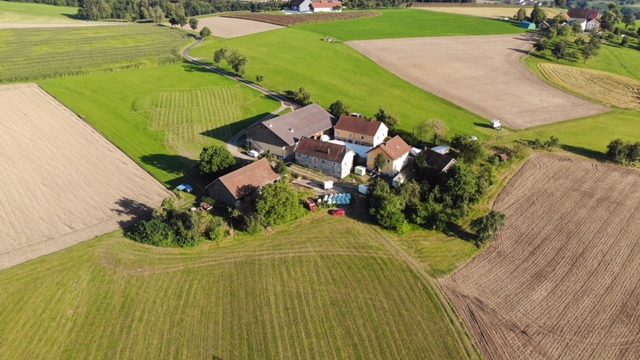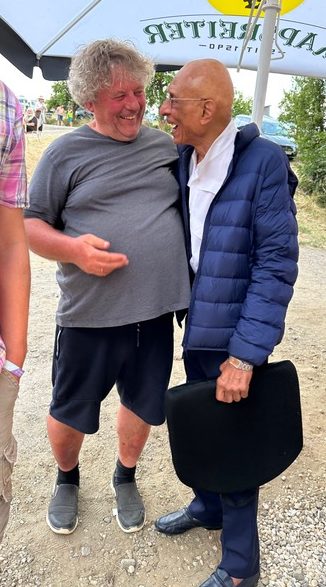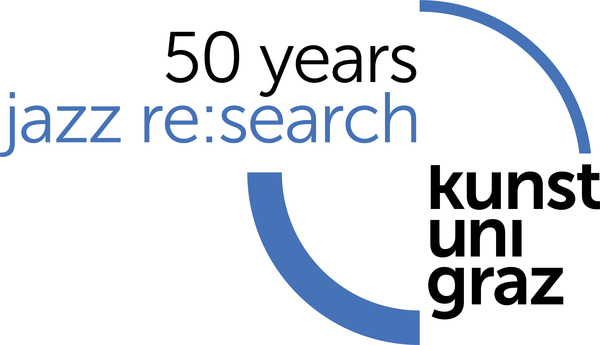19.-21. Juli 2024
Buchmannhof/Diersbach
INNtöne Jazzfestival 2024


19.-21. Juli 2024
Buchmannhof/Diersbach
Die Deutsche Jazzunion feiert im Juli 2023 ihr 50jähriges Bestehen und veranstaltet aus diesem Anlass vom 13.–15. Juli 2023 ein Jubiläums-Jazzforum am historischen Ort der Vereinsgründung im Jahr 1973.
Programm:
https://www.deutsche-jazzunion.de/jubilaeums-jazzforum/

Musik aus dem hohen Norden und tiefen Süden:
Die Inntöne gehen wieder auf Weltreise

Inntöne proves Radio Jazz Research is not only about radio and jazz is totally wrong. And, with its Austrian ‘Ehrenmitglied’ Paul Zauner, it has a live music promoter here in his element. Carefully curating, being the genial host, on his own family farm.
Through his diligent research, we have a great idea of the cross section of quality jazz and improvised music which is around. Hardly as intimate as a club such as the Vortex, there is nevertheless a contact with musicians and indeed Zauner, who is often to be seen in the audience with a broad grin as he appreciates the music.
More than enough space for all, and an excellent choice of food and drink, the festival this year experimented and grew, using better its spaces such as the barn, where the festival used to be focussed before Covid.
While the music more than nods to its American roots, the selection of musicians had a strong European feel, as well as a great diversity.
There were a couple of ‘tributes’. First, more directly, a reworking of Mingus’s classic “The Black Saint and The Sinner Lady”, by saxophonist Clemens Salezny and Gregor Aufmesser, which allowed us to realise how a live performance of a classic can really add to our appreciation; and the other, more indirectly, David Helbock’s Austrian Syndicate, dedicated in name at least to Joe Zawinul, the Austrian keyboard trailblazer. Helbock is very much at the forefront of the band, relishing the opportunity to experiment, almost hyperactively, on his set of keyboards. Tempered by pianist Peter Madsen (equally a father figure of the Austrian scene especially in the west of Austria from where Helbock comes) and a trio of bass, percussion and drums. They balance the high energy and electricity which Helbock delivers.
The Austrian Syndicate was one of the daily energetic openers which would wake us up for the music ahead.
Similarly, we heard baritone saxophonist Helga Plankensteiner on Saturday with a tribute to the music – and outgoing personality – of Jelly Roll Morton. We were reminded of his other activities, such as gambler and pimp, as well as giving us a strong argument for his claim that he ‘invented’ jazz. A band which focussed on the lower registers, since in addition to Plankensteiner was bass clarinettist Achille Succi, sousaphone and drums.
Sunday’s opener was exciting as it was a chance to hear the first gig in a while of Tom Challenger’s Brass Mask. By slightly changing the lineup, apparently by force of circumstance as much as volition, he had an extra trumpet in Byron Wallen (who also doubled beautifully on conch shell) and used Caius Williams on electric bass (instead of tuba). It gave a good basis for new compositions, which were added to some of the band’s New Orleansy stalwarts.
Brass Mask was one of a particular feature on bands from London, of quite a variety. Xhosa Cole brought his quartet, and mesmerised with his Monk tunes in particular (where he brought on Byron Wallen and George Crowley as guests) but was highlighted by a solo version of Round Midnight.
There was also Freight Train, with Irish folk diva Cathy Jordan , egged on by Liam Noble and Paul Clarvis. Jordan is quite a blues shouter, and, behind her, Noble and Clarvis delivered their (dis)respectful takes on the music.
Zara MacFarlane took, I think, a couple of tunes to warm up. But by the end she had the audience in raptures with her jazz fused with soul, and her bubbly personality.
The other band from London was very different. Alexander Balanescu came with his string quartet. Perhaps best known nowadays for his arrangement of the University Challenge theme on TV, here he showed why this band had been at the forefront of the diversification of the string quartet repertoire. Especially effective was his violin rhapsodizing in the style of Romanian and Balkan folk musicians, reflecting his own roots in Romania.
Perhaps the closest to an ‘American’ quartet was that of saxophonist Hermon Mehari, born and brought up in Kansas. But the name of the group ‘Asmara’ gives away his Eritrean roots, which are subtly infused through the set.
There was a strong focus on woman performers in addition to those mentioned above. Pianist Johanna Summer played a solo set, building on her classical reinterpretations. Then there were three all-female bands. Two contrasting trios, with ECM saxophonist Mette Henriette, playing a minimalistic Nordic set with piano and cello, and the punkish, heavy groove of the high energy French band Nout (on which more in Alison Bentley’s review from Suedtirol). The repertoire could have felt unexpected with instrumentation of flute, harp and drums, as it grew from a quieter minimalistic start.
But also the all-star Scandinavian band of mesmerising percussionist Marilyn Mazur. Shamania gives a good indication of spirituality, here from a more northerly perspective, much of the music dating from the need to find new alternatives during lockdown. Balancing energy and giving a lot of freedom for musicians such as Danish saxophonist Lotte Anker, Norwegian trumpeter Hildegun Oiseth and Josefina Cronholm.
As much as the openers each day set us up, the closers on the main stage also balanced showmanship and technique. Brazilian accordionist Renato Borghetti, who played instruments of all sizes, was matched by the virtuosity of the rest of his band, reeds Pedro Figuereido, guitarist Daniel Sa and pianist Vitor Peixoto. And, finally on Sunday, Vieux Farka Toure built up the pace and volume steadily in a performance of desert blues, so that, by the end, we were all dancing as darkness fell.
But that wasn’t all, since the event also had us enjoying the history of jazz (in the farm’s barn) using some of the few US band leaders there, with Chanda Rule’s Sweet Emma band and veteran gospel/blues singer Janice Herrington and the jam in the pub (pigsty). By the way, on these we had a festival first, in that Paul Zauner broke one of his own rules of the festival, and joined in on trombone, only the second time in the 30+ years of the festival, he had blown his own instrument. Then on Sunday night the jam was graced with legendary 86-year old Kirk Lightsey, who had rushed over from London. Sounding like someone less than half his age, he played with an imagination that really placed him in the pantheon of Detroit great pianists which included Barry Harris and Tommy Flanagan. It boosted the rest of the band (led by Dmitry Baevsky on alto and Joe Manarelli on trumpet) who had already played well enough the night before with Oliver Kent on piano.
Es gibt in diesem Jahr gleich zwei Ausgaben des Jazzfestivals INNtöne, die unser Ehrenmitglied Paul Zauner auf seinem Diersbacher Bauernhof (Oberösterreich) ausrichtet. Nach dem „Tastenfestival“ zu Pfingsten hier das Programm des großen Festivals 22. – 24. Juli 2022.

Dear presenters,
We are very pleased to announce that our conference “Jazz Re:Search in 21st-Century Academia and Beyond” will take place as a live conference from June 9 to 12 2022 – a very warm welcome to everyone who will join us in Graz! Here is the revised schedule.
We would like to remind you that conference registration is now open. If you have not already registered, we kindly ask you to do so following this link: https://www.aanmelder.nl/128370/admin/registrationform
After more than two years of the pandemic, we are determined to host a face-to-face conference – with the aim of “bringing researchers together”, to quote the Rhythm Changes motto. Nevertheless, the pandemic has not (yet) vanished, so we plan to stream parts of the conference (including both keynotes as well as selected sessions) via Zoom for participants unable to attend due to health issues. Currently, we are working on technical solutions to enable interaction between presenters and audiences on-site and online. More information about online modalities will follow, also concerning the registration to a reduced fee.
Furthermore, we can inform you that most COVID regulations are suspended in Austria. There are no restrictions for bars and restaurants in Graz, at KUG wearing a face mask is recommended. In due time, you will receive an update concerning the current regulations.
We are very looking forward to meeting you all in June!
With warm regards
Benjamin Burkhart and Philipp Schmickl (on behalf of the conference organizing team)
New Way of Streaming! Unser Statement.
Wir haben wieder einen Livestream eingerichtet und streamen alle Konzerte und Interviews und Magazinformate wie auch die Jazzgespräche in HD Qualität.. Der Livestream der Konzerte haben wir neu hinter eine Paywall gestellt und können dank der Unterstützung von Bund und Kanton plus dem Migros Kulturprozent den Musiker*innen 85% der Einnahmen weitergeben. Also vom Konzert was CHF 10.- kostet bekommt die Band CHF 8.50 vom ersten Stream an. So, denken wir, sollte der Stream für Jazz und nicht kommerziellen Mainstream funktionieren. Wir wollen einen ersten Schritt machen das die Musiker*innen auch etwas bekommen für ihr Streamkonzert und dass die Zuschauer*innen ersten merken dass der Stream wie das richtige Konzertticket etwas kostet und zweitens damit nicht eine «Billigplattform» zuerst all ihre Kosten plus die Aktionäre bedient, bevor die Musiker*innen nach x Millionen Clicks etwas abbekommen.
Here you go:
All info’s off the Festival is attached in the program booklet (in german) and here www.jazzfestival.ch .
The program:
Mittwoch 11.5.
20.15 Uhr Obradovic – Tixier Duo (www.ladaobradovic.com)
Lada Obradovic dr, pc, voc, comp, David Tixier p, keyb, comp
Das «Obradovic-Tixier Duo» ist eine Zusammenarbeit zwischen der Kroatischen Schlagzeugerin Lada Obradovic und dem Französischen Pianisten David Tixier. Polyrhythmische Schichten, verflochten mit anspruchsvollen Harmonien und gerissenen Polymetrien, dienen als Quelle für die Überlieferung der von Emotionen und Eleganz geleiteten Musik. In Bern ausgebildet, ist Lada auf den europäischen Festivalbühnen sowie auch als Schlagzeugerin und Schauspielerin in der Netflix Serie «The Eddy» zu sehen.
21.30 Uhr Niklaus Troxler / Manuel Troller (www.troxlerart.ch, www.manueltroller.com)
Niklaus Troxler Tape Performance, Manuel Troller g
Im künstlerischem Austausch mit dem Luzerner Gitarristen und Schweizer Musikpreisträger Manuel Troller, lässt Troxler am Eröffnungsabend eines seiner Tape-Bilder live vor den Augen des Publikums entstehen.
22.15 Uhr Nils Wogram Muse (www.nilswogram.com)
Nils Wogram tb, Kathrin Pechlof hp, Gareth Lubbe vla, vl, Obertongesang, Hayden Chisholm as,
Ganz oder gar nicht! Keine halben Sachen! Wo sich im Lauf ihrer Karriere bei vielen anderen Künstlern Routineabnutzungen bemerkbar machen, reift in Nils Wogram die Erkenntnis, dass jedes neue Projekt zugleich sein erstes Projekt ist. Ganz besonders spürbar ist das mit seiner neuen Band «Muse». Die Musik mag komplex sein, doch ist ihre immanente Schönheit und Freundlichkeit bei aller formalen Strenge auch für die Zuhörenden enorm entspannend. Klang ist die entscheidende Komponente, jeder Ton zählt.
Donnerstag 12.5
20.15 Uhr Humair/Blaser/Känzig (www.samuelblaser.com)
Samuel Blaser tb, Daniel Humair dr, Heiri Känzig b
Drei Generationen von Schweizer Spitzenjazzern aus drei verschiedenen Landesteilen; Blasers kräftiger Ton und seine weit ausschweifenden Improvisationen werden umrahmt vom organischen Tumult des ineinandergreifenden Rhythmus von Känzig und Humair. Zwischen Atem, Saiten und Sticks, Slides, Holz und Fellen entsteht eine Alchemie, die durch Inspiration und Kreativität den Klang in Momente purer Poesie verwandelt.
21.15 Uhr Florian Favre «Idantitâ» (www.florianfavre.com)
Florian Favre p
Mit Idantitâ lässt Florian Favre die traditionelle Musik seiner Heimat, der Region Freiburg, neu aufleben. Es sind Geschichten von Elfen, Bergen, Exil, naiver Schönheit, Geschichten über ein schönes Land und einer kollektiven Vorstellung davon. Favre lässt daraus stimmungsvolle, lyrisch bis kraftvolle Klavier-Musik entstehen, die in ihrer unaufdringlichen Schönheit charakteristisch ist für den Freiburger Pianisten.
22.00 Uhr Gauthier Toux «For a Word» (www.gauthiertoux.com)
Gauthier Toux p, Valentin Liechti dr, Julien Herné b, Léa Maria Fries voc
Gauthier Toux huldigt in seinem abenteuerlichen neuen Quartett «For A Word» der Macht des Wortes. Die Formation, anlässlich einer Carte Blanche am Cully Jazzfestival 2017 gegründet, ziseliert Melodien ebenso wie die Stille und behandelt die Stimme wie ein Instrument. Die Band bietet Jazz-Eskapaden, Pop-Höhenflüge und Klangnebel. Atemberaubend und brillant.
Freitag 13.5
20.15 Uhr Andrina Bollinger Trio (www.andrinabollinger.com)
Andrina Bollinger voc, p, g, Jules Martinet b, Arthur Hnatek dr
Andrina Bollinger steht für immer wieder überraschende Bühnenperformances: Mal tritt sie als Schloss auf, dann als Turrells Skyspace, oder sie gibt sich als innerer Ozean zu erkennen. Alle diese Räume erforscht und bespielt Bollinger mit ihrer Stimme – sie schreit, summt, spricht, schnauft darin. Bisher vor allem Solo und in verschiedenen Duo-Konstellationen zu sehen, präsentiert Andrina Bollinger ihr neues Trio mit Arthur Hnatek am Schlagzeug und Jules Martinet am Bass.
21.15 Uhr This is Pan (www.thisispan.com)
Matthias Kohler as, comp, Lukas Thoeni tp, Dave Gisler g, André Pousaz b, Gregor Hilbe dr
«This Is Pan» präsentiert sich mit geballten Pferdestärken, viel Verve und einem druckvollen, unverkennbaren Bandsound. Das neue Programm «Animal Heart» widmet sich ganz und gar den Lieblingstieren von Bandleader und Saxofonist Matthias Kohler – im Kern geht es aber um Empathie und Menschlichkeit. Detaillierte, der Song-Form verpflichtete Kompositionen und starke Solos zeichnen die Band aus.
22.15 Uhr LIUN + THE SCIENCE FICTION ORCHESTRA (www.luciacadotsch.com)
Lucia Cadotsch voc, Wanja Slavin fl, cl, sax, synth, Magnus Schriefl tp, Kati Brien fl, cl, as, Florian Trübsbach fl, cl, ts, Johannes Lauer tb, Shannon Barnet tb, Mark Pringle p, Matthias Pichler b, Fabian Rösch dr
Gemeinsam mit dem Berliner Saxofonisten und Komponisten Wanja Slavin schlägt Lucia Cadotsch ein ganz neues Soundkapitel auf: Urbane Musik mit dunklen Beats, schillernden Synths und pulsierenden Hooklines. Der Sound von LIUN + The Science Fiction Orchestra ist so eigensinnig und betörend, wie nur die Zukunft klingen kann. LIUN kreiert eine phantasmagorische Welt, eine Synthese aus digitalen und analogen Elementen, und – im Zusammenschluss mit dem Ensemble – eine Welt, die hineinführt in ungeahnte, noch nie gehörte Klang-Dimensionen.
Samstag 14.5.
20.15 Uhr Leipold / Bucher / Lo Bianco (www.samuelleipold.com)
Samuel Leipold g, Jürg Bucher cl, Luca Lo Bianco b
Mit dem sizilianischen Kontrabassisten Luca Lo Bianco, dem Berner Jürg Bucher an der Klarinette und dem Luzerner Gitarristen Samuel Leipold treffen sich drei Musiker mit musikalischem Tiefgang. Sie kreieren kammermusikalische Musik, in der die verschiedenen Schattierungen in den Klangfarben der Instrumente ausgelotet werden. Leipolds songhafte bis abstrakte Kompositionen werden in den grösseren musikalischen Bogen eingebunden und dienen als Start oder Endpunkt für gemeinsame Improvisationen.
21.15 Uhr Sarah Chaksad Large Ensemble (www.sarahchaksad.com)
Yumi Ito voc, Sarah Chaksad as, ss, comp, Fabian Willmann ts, bcl, Catherine Delaunay cl, bs, thn, Fernando Brox fl, Hildegunn Øiseth tp, goat hn, Lukas Wyss tb, Paco Andreo vtb, Sophia Nidecker tub, Fabio Gouvêa g, Julia Hülsmann p, Dominique Girod b, Eva Klesse dr
Sarah Chaksad überrascht mit Kompositionen für eine neue, 13-köpfige Band: Ihr hellwaches Large Ensemble hat sich die Saxofonistin und Komponistin sorgfältig mit erlesenen deutschen, französischen und Schweizer Musikerinnen und Musikern, einer Norwegerin und einem Brasilianer zusammengestellt. Das Resultat unterscheidet sich, auch wenn die Handschrift der Komponistin gut hörbar bleibt, von früheren Projekten. Sarah schafft mit ihrem Large Ensemble einen Reichtum an Farben und Stimmungen wie noch nie. Die Musik ist offener und riskanter, ohne je an Fluss und Drive oder Intensität zu verlieren.
22.15 Uhr District Five (www.districtfive.band)
Tapiwa Svosve as, synth, voc, Vojko Huter g, voc, Xaver Rüegg b, Paul Amereller dr
District Five durchbrechen die Grenzen der Generationen. Math-Rock, Post-Punk, Jazz, Electronica, Filmmusik: So lauten die Eckpfeiler eines neuen Sounds, mit dem die vier Zürcher Vordenker festgesessene Stilbegriffe endgültig verlassen und ihre eigene Avantgarde zu bilden beginnen. Diese Musik heisst nicht mehr Jazz, bedeutet aber auch nicht Pop. Nein, vielmehr ist es ein Prozess vom Finden neuer Freiheiten und setzt zugleich ein Zeichen ungemeiner Diversität sowie langjähriger Freundschaft. Oder in den Worten der Band: «Searching together through music for something like freedom in a trapped world».
Parallel zu unserer 42. RJR Tagung "Sozialgeschichte im Jazz – In Erinnerung an den Musiker und Musikwissenschaftler Ekkehard Jost (1938-2017)" findet in Graz die 13. Internationale Jazz Research Conference statt. Aufruf zur Einreichung von Beiträgen/Call for papers
Die neue Ausgabe der Grazer Jazz Research News Nr. 58 ist erschienen. Anfragen zur Ausgabe der Publikation bitte an office@jazzresearch.org richten.
Es erscheinen vier interessante Publikationen, geschrieben von Autoren und Mitgliedern, die beispielhaft die Themenbreite von Radio Jazz Research demonstrieren:
Jürgen Arndt: Caterina Valente, Wolfgang Lauth, Jazz und Schlager. Facetten der 1950er Jahre und darüber hinaus. Olms-Weidmann, Hildesheim/Zürich 2021, 48.00 €
Georg Bertram/Michael Rüsenberg: Improvisieren! Lob der Ungewissheit. Reclam, Stuttgart 2021, 12.00 €*
Willem Strank: Handbuch Filmgeschichte. Von den Anfängen bis Heute. UTB 39.90 €
Hans Christian Hagedorn: “Don Quixote’s Adventures in the World of Jazz: 200 Examples and a Few Remarks”. In: Anales Cervantinos (Zeitschrift der spanischen Forschungsgesellschaft CSIC Consejo Superior de Investigaciones Científicas) 54, 2022, S. 101-173, ISSN: 0569-9878, e-ISSN: 1988-8325, https://analescervantinos.revistas.csic.es/index.php/analescervantinos/issue/view/27 (open access).
—————-
* Die Improvisationsgeschichte behandeln wir in der 42. RJR-Tagung in Siegburg 2022.
The Vortex is happy to have won the Venue Of The Year 2020 at the JazzFM Awards. We feel that it is an award which encourages us in these difficult times to keep going and work together with musicians to help get great music heard. Very little live music has come back so far, and so we feel responsible!